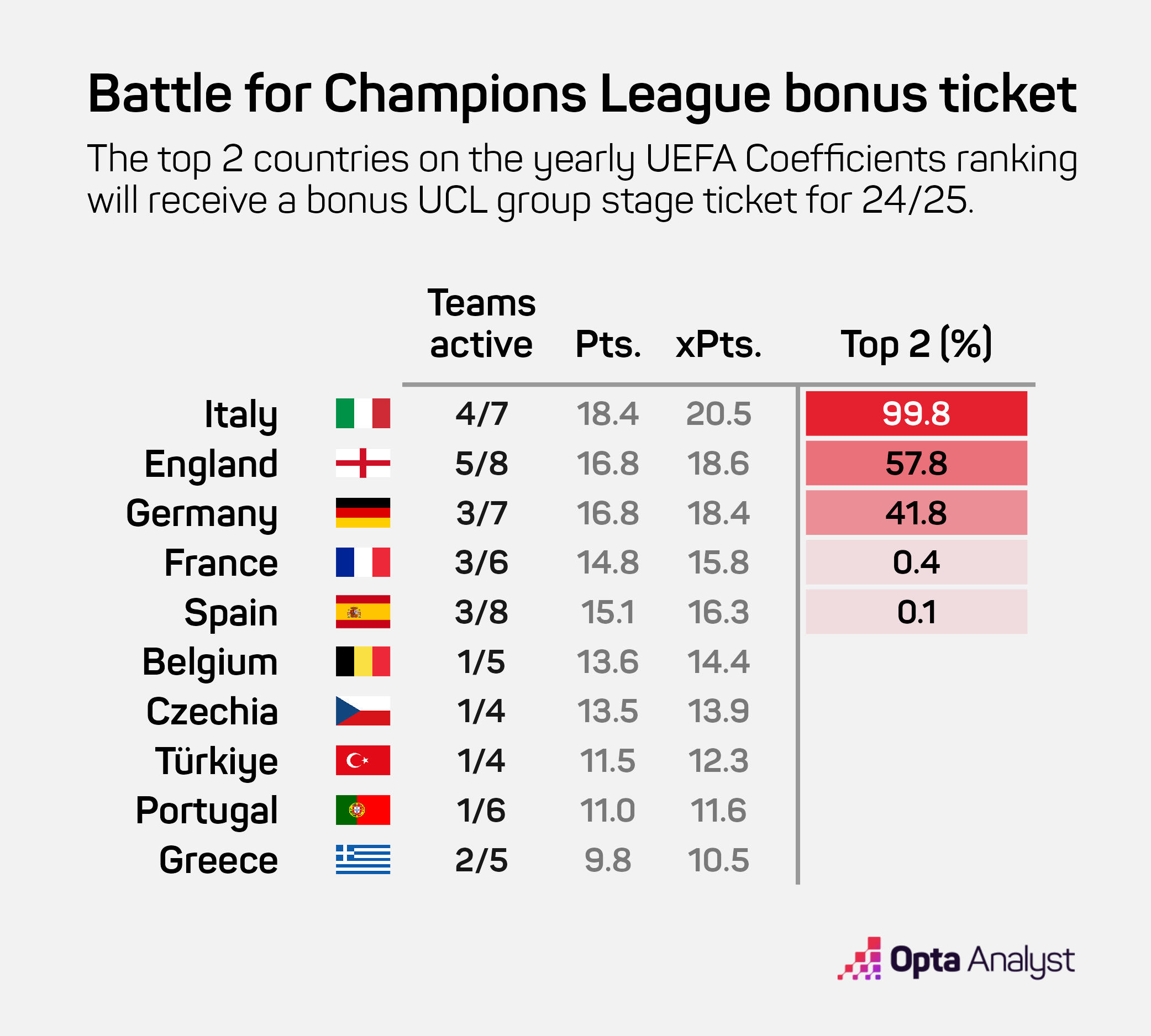Five Premier League teams could qualify for Champions League through league position; traditionally, there have only been four clubs who qualified through their league place; Premier League had a 58 per cent chance of claiming bonus spot before this matchweek

Image: Spurs fans will be hoping former striker Harry Kane does not hinder their Champions League ambitions on Wednesday night
The quarter-finals of this year’s European competitions are only at the midway point, but England’s hopes of pipping Germany in the race for an extra Champions League spot look set to go down to the wire.
Heading into this week’s matches, English clubs sat ahead of their German counterparts – but only on countback with the two countries locked on the same coefficient points.
In the reformatted edition of next season’s competition, the two countries with the highest co-efficient will be given an extra group-stage place.
The Premier League had a 57.8 per cent chance of claiming the bonus Champions League spot, according to Opta, going into this European matchweek.
With Germany and England neck-and-neck in that race, each win, draw and qualification for the next rounds is huge. Each win is worth two coefficient points, a draw gets you one, and you get nothing for a defeat. There are also bonus points for getting to certain stages, so Borussia Dortmund overturning their Champions League first-leg deficit to beat Atletico Madrid on Tuesday gives Germany a further bonus point in their ranking.
Meanwhile, Bayer Leverkusen’s first-leg victory over West Ham and Liverpool’s heavy home defeat at the hands of Atalanta has changed the appearance of the coefficients.
- Champions League fixtures | Results
- Download the Sky Sports app | Get Sky Sports on WhatsApp
Datawrapper This content is provided by Datawrapper, which may be using cookies and other technologies. To show you this content, we need your permission to use cookies. You can use the buttons below to amend your preferences to enable Datawrapper cookies or to allow those cookies just once. You can change your settings at any time via the Privacy Options. Unfortunately we have been unable to verify if you have consented to Datawrapper cookies. To view this content you can use the button below to allow Datawrapper cookies for this session only. Enable Cookies Allow Cookies Once

Every win English clubs can manage in this season’s continental tournaments will help – but with Arsenal facing Bayern Munich in the Champions League quarter-finals and West Ham in the Europa League against Bayer Leverkusen, the fact each match also affects Germany’s hopes makes every result all the more significant.
The change will see 36 teams competing in the competition in a ‘Swiss league’ style, allowing for an additional place to be allocated to the two countries whose clubs perform best across all UEFA competitions.
Why does this fortnight mean so much?
Two leagues will get an extra place in the competition based on performances in Europe this season, which are measured by the coefficient rankings.
With Germany and England neck-and-neck, each win, draw and qualification for the next rounds is huge – and magnified only further with two English sides taking on German sides across the next fortnight.
Arsenal drew 2-2 with Bayern Munich, while West Ham were beaten 2-0 at Bayer Leverkusen on Thursday, however, Dortmund beat Atletico Madrid 5-4 on aggregate in their Champions League last-eight tie on Tuesday night.
Liverpool’s shock 3-0 home defeat by Atalanta means Italy can mathematically secure an extra Champions League spot if Fiorentina win and Atalanta do not lose in their respective second legs next week.
Coefficient points
Standard points for CL, EL & ECL
Win: 2pts Draw: 1pt *Points are halved in qualifying rounds
Bonus points
Champions League
Group stage participation: 4pts R16: 5pts QF,SF & final: 1pt
Europa League
Group winners: 4pts Group runners-up: 2pts R16, QF,SF & final: 1pt
Europa Conference League
Group winners: 2pts Group runners-up: 1pt SF & final: 1pt
The number of points awarded each season is divided by the number of teams that participated for that association in that season and rounded to three decimal places.
England has five teams left in Europe with Man City and Arsenal in the Champions League, Liverpool and West Ham through in the Europa League and Aston Villa progressing to the last eight of the Europa Conference League.
Germany have only three teams remaining – Bayer Leverkusen in the Europa League along with Champions League quarter-finalists Bayern Munich and Borussia Dortmund.
Champions League
England: Man City, Arsenal
Germany: Bayern Munich, Borussia Dortmund
Europa League
England: Liverpool, West Ham Germany: Bayer Leverkusen Italy: AC Milan, Atalanta, Roma
Europa Conference League
England: Aston Villa Italy: Fiorentina
With Fiorentina progressing to the Europa Conference League quarter-finals, there are four Italian teams left standing with Atalanta (EL), AC Milan (EL), Roma (EL) and Fiorentina (ECL).
- World Cup 2026 increased to 104 matches & 48 teams | FIFA expands CWC
- Get Sky Sports | Download the Sky Sports app
From 32 to 36 – who gets the additional places?
- One place will go to the club ranked third in the championship of the association in fifth position in the UEFA national association ranking
- One place will be awarded to a domestic champion by extending from four to five the number of clubs qualifying via the so-called ‘Champions Path’
- The final two places will go to the associations with the best collective performance by their clubs in the previous season (total number of points obtained divided by the number of participating clubs)
Regarding the final bullet point, those two associations will earn one place for the club best ranked in the domestic league behind the Champions League positions.

Aleksander Ceferin says the growing popularity of football in the USA could see a future Champions League final being hosted there. Credit: Men in Blazers Media Network @meninblazers
For example, based on the collective performance of their clubs last season, England and Italy would have both had an additional spot in the Champions League – meaning Liverpool and Atalanta – both fifth in their respective leagues – would have entered the competition.
How does this affect the other UEFA competitions?
Qualification for the two other UEFA competitions, the Europa League and Europa Conference League, will follow the same protocols as in previous years, albeit if the fifth spot qualifies for the Champions League, the Europa League spot will go to the team finishing sixth.
Similar format changes will also be applied to the Europa League (eight matches in the league stage) and Europa Conference League (six matches in the league stage) and both will also include 36 teams in the league phase.
If England receive five CL places, does the ECL spot go down to eighth?
Yes, it does – provided the domestic cups are won by those finishing inside the top seven as seen last season, with Manchester United winning the Carabao Cup and Manchester City winning the FA Cup.
Based on last season, eighth-placed Tottenham would have qualified for the Europa Conference League and Aston Villa would have been promoted to the Europa League.
How could this impact the 2024/25 domestic leagues schedules?
Given the Champions League will almost double in size – from a total of 125 games to 225 – at least four additional matchdays will be required to fit in the extra games. This will inevitably cause issues for domestic leagues, with fewer dates to fit in all their games.
How does the new Champions League format work?
Taking the total number of teams from 32 to 36 in the Champions League, the biggest change will see a transformation from the traditional group stage to a single league phase including all participating teams.
Every club will now be guaranteed a minimum of eight league-stage games against eight different opponents (four home games, four away) rather than the previous six matches against three teams, played on a home-and-away basis.
The top eight sides in the league will qualify automatically for the knockout stage, while the teams finishing in ninth to 24th place will compete in a two-legged play-off to secure their path to the last 16 of the competition.

Sky Sports’ chief reporter Kaveh Solhekol looks at why Ceferin has decided to not stand again for UEFA president
Has the Premier League had five CL participants before?
Previously in 2005, when Liverpool won the Champions League but finished outside the top four, the Premier League was granted five potential Champions League berths, with the caveat of having to go through qualifiers.
During the 2015/16 season, Spain became the first association to have five teams in the Champions League group stage after Sevilla lifted the Europa League, despite finishing outside the top four in LaLiga the previous campaign, while Valencia came through the play-off round.
Remarkably, there is even a chance – albeit an extremely unlikely one – of there being as many as seven Premier League clubs in the Champions League next season based on the change in rules.
That would require both the Champions League and Europa League winners to be from the Premier League and both teams finishing outside the top five in the top flight.
Get Sky Sports on WhatsApp!

You can now start receiving messages and alerts for the latest breaking sports news, analysis, in-depth features and videos from our dedicated WhatsApp channel!
Find out more here…
Sourse: skysports.com